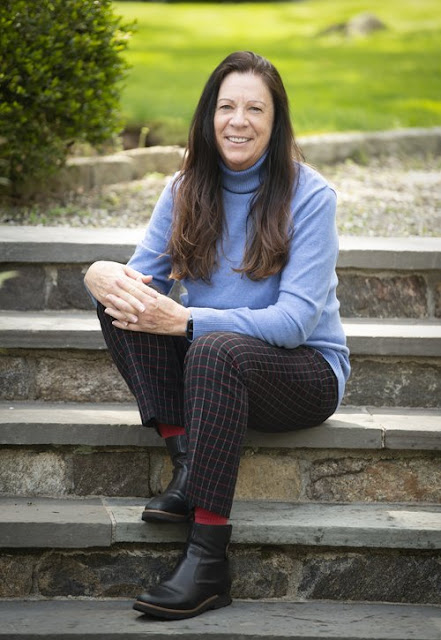 magazine, Bradley has been awarded residencies at Ragdale, Community of Writers, and Writers in Paradise. She lives in New York City.
magazine, Bradley has been awarded residencies at Ragdale, Community of Writers, and Writers in Paradise. She lives in New York City.
Bradley's debut novel is The Home for Wayward Girls.
My Q&A with the author:
How much work does your title do to take readers into the story?Visit Marcia Bradley's website.
There was one word that came to me when I was writing my book. That was wayward; a word that guides the reader in many ways. The definitions of wayward run the gambit from difficult to disobedient as well as following no clear pattern. My agent and I first thought of having Wayward as a one-word title; we also tried to come up with a list of alternative titles to include when the book was sent to editors. We considered Silent Cloud which left us needing air. Then a few that I felt were very off point like At His Feet and What Sinners Do.
I kept going back to the original idea for the book. I’d been out west, driving really fast because the speed limits there are mind boggling. We passed a building with a sign that said Home for Girls. And that led me to my title: The Home for Wayward Girls. My agent and I were sure of this title; my editor at HarperCollins was 100% in agreement. And I was totally relieved because I knew it was right and that readers would feel taken into the story immediately.
What’s in a name?
It’s funny for me as a writer to find that some things in a story remain constant from first draft, through revisions, and to the final copy. In my book, the strong-willed, seventeen-year-old living on a ranch who would become an even stronger-willed adult helping runaways in New York City was always named Loretta. A part of me thought of the country singer Loretta Lynn and how much she overcame in her life. I also just liked that it’s an unusual name and has substance. I find that people who have read early copies of the book never forget Loretta or her name and that means a lot to me.
How surprised would your teenage reader self be by your novel?
My teenage self would be cheering right now and a little surprised. Not because I had the idea for a book but because I actually finished it! My teenage self knows that I have always had tons of ideas. My entire family is like that. We putter and muse about our creative ideas. But for me, execution isn’t my strong suit. When I was a teen, I was reading Richard Bach’s Love Story and Stephen King’s Carrie. Quite a combination. Right now, my teenage self would be telling me to get to work on the next book!
Do you find it harder to write beginnings or endings? Which do you change more?
This question has me thinking about how I like to engage the reader at the very beginning of a book or story I’m writing. I want the reader to feel that they have the chance to anticipate what is coming by the end. I set the beginning and end right away and it’s rare that I change them. In The Home for Wayward Girls, the story starts when Loretta is in her 30’s. Readers get to experience both her past when she was a teen on her parents’ ranch as well as her present-day life in big, bustling New York City. Much of what will happen to Loretta is foreshadowed in those early pages and I love when readers tell me they knew this would happen but didn’t expect that and were so relieved when such and such occurred. In this way, we’re all a part of Loretta’s life, and for me that means we all take responsibility in a small way to applaud her and to care about survivors like her.
Do you see much of yourself in your characters? Do they have any connection to your personality, or are they a world apart?
My stories are about people finding an inner strength to get them through difficult situations although some characters handle life better than others. The more Iwrite, the less these stories are about me or anyone I know. What happened with The Home for Wayward Girls is that Loretta became my hero. She still is. She never gave up and gosh did life try to get her to collapse, roll over, and stay under William’s control. I think about Loretta hitchhiking across the country alone and the tough exterior she had to wear, and I’m wowed. Every time I read about the evening when she finally makes it to the big city, I get emotional. It’s a very simple scene, so little happens, yet it is huge for my character and for me.
Still, I admit that there’s always something of myself and members of my family included. All the characters in this book matter but I’d like to add that Mrs. Barry, the librarian at Loretta’s school, is based on someone in my family who is no longer with us. I loved including her and the way she very kindly helps Loretta map out her journey is just plain great. Including Mrs. Barry was special. Librarians rock.
My Book, The Movie: The Home for Wayward Girls.
--Marshal Zeringue